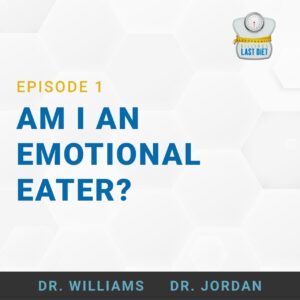#3: Ozempic and Weight Loss
Episode Title: Navigating the Pros and Cons of GLP-1 for Sustainable Weight Loss
In this episode, Dr. Jordan and Dr. Williams dive deep into the world of GLP-1 medications, such as Ozempic and semaglutide, which have become increasingly popular for weight loss. They explore the mechanism behind how these medications work, the potential benefits, and the significant drawbacks that individuals need to be aware of.
The discussion covers:
- Understanding GLP-1: What it is, how it mimics the hormone glucagon, and its effects on regulating blood sugar and appetite.
- The Weight Loss Advantages: How GLP-1 can suppress appetite, leading to reduced calorie intake and rapid weight loss, as seen in the “Hollywood weight loss” trend.
- Nutritional Concerns: The risks of losing lean body mass, the potential for nausea and constipation, and the importance of maintaining a balanced diet.
- Long-Term Health Implications: Exploring the potential long-term side effects, such as thyroid issues and gastrointestinal complications, and the need for comprehensive support.
- Billings Last Diet’s Specialized Protocol: Introducing a tailored program that addresses the unique needs of individuals using GLP-1 medications, focusing on proper nutrition, protein intake, and lifestyle coaching for sustainable weight loss.
Whether you’re considering GLP-1 medications or are already using them, this episode provides valuable insights to help you make informed decisions and achieve lasting weight management success.
Follow us on the web: https://billingslastdiet.com
Follow The Last Diet on socials:
Facebook | Instagram | TikTok
Transcript
Dr. Jordan 0:07
Welcome back to Billings. Last diet Podcast. I’m Dr Jordan, along with Dr Williams, today, we’re going to talk about GLP ones, some of the pros, some of the cons, and how you can find long term sustainability with that weight loss journey. So Dr Williams, let’s jump right into it. GLP ones. What? What is a GLP one? And how does it work?
Dr. Williams 0:26
Yeah, a lot of people have heard of GLP ones. These are the ozempic. The are called one of the classes is a semaglutide, and they’re become very popular for assisting people in weight loss. It kind of got its legs in Hollywood. And all these Hollywood celebrities had lost weight all of a sudden. And in fact, they lost the weight so sudden that they called it the Hollywood weight loss look, or something like that, with a sunken face and the pencil legs right because of the the rapid weight loss, and we’ll talk about some of the reasons they had the the gaunt face and the pencil legs right is because of the some of the side effects of the semaglutide. But these GLP ones, it’s a glucagon like peptide or protein. That’s what GLP one is, and and it, it alters the way the body the hormones, the way the hormones work in the body through a medication that that’s that’s what the GLP one is.
Dr. Jordan 1:37
Now real quick, just so everybody knows what we’re talking about the the glucagon, that’s a hormone in the body, and so what this medication is doing is kind of mimicking that, that glucagon, and glucagon is the opposite of insulin, or near up, near opposite hormone, yeah. So what that means is, when you are satisfied, right, you have glucan, right? Is that? Right?
Dr. Williams 2:01
Yeah, so glucagon, glucagon and insulin are hormones that regulate the way the body utilizes its energies, and so there’s a balance in there. And the GLP one the glucagon, like peptide or protein, yes, mimics the glucagon and it helps regulate sugar. So the medications were originally designed for type two diabetics in order to help them to regulate their blood sugars, and that’s still what they’re used for, but now they’re positive side effects is going to help you lose a positive side effect was the proper regulation of hormones. So,
Dr. Jordan 2:46
so what my understanding of a GLP one? It’s typically an injection into your abdomen, right? And it’s going to help you feel satiated or suppress your appetite. Why does it do that?
Dr. Williams 3:01
There’s a couple of different ways it does it. There’s one of the pathways for suppressing the appetite is it slows the way the how fast the stomach empties, so you feel fuller longer, okay? And so that’s one way. And then it also has an effect on the brain, which drops your appetite. So it’s a, there’s a neurological brain component as well as a physical slowing of the emptying of the stomach, so…
Dr. Jordan 3:29
So it’s going to help you one feel fuller longer, and probably cut down on those cravings as well. So we can, obviously, you can see why that would help people lose weight, right? Because one of we’ve talked about on podcast before one of the main components of weight gain is that emotional eating pattern, right? And so if we can cut down on those, those urges, those cravings, you’re going to eat less, right?
Dr. Williams 3:54
And when you with an appetite suppressant, you’re just not hungry, and so you don’t eat as much, which is one of the bit of a downside to the GLP ones, is just because you’re eating less doesn’t mean you’re being more healthy. Yeah, because you’re you’re decreasing nutrients as well. Some of the micronutrients or vitamin or minerals that are that are necessary.
Dr. Jordan 4:17
So let’s talk about some of those, some of those drawbacks as well. So obviously, they’re effective, right? And we’ve seen that in Hollywood. We’ve seen that in social media. It’s really all over. You can’t go anywhere without hearing about GLP one or semi glutide. So some of those drawbacks you mentioned nutrition in general, right? If you’re just eating less, that doesn’t mean you’re necessarily eating correctly, you’re just burning or having less calories to burn so you burn fat. Yeah. So what are, what are other health concerns that might you might have if you’re on GLP one?
Dr. Williams 4:53
About 50% of the people who take GLP ones have the side effect of of nauseous, of nausea. Okay, a lot of nausea. And the reason, again, is because the stomach empties slower, and so your stomach feels upset a bit, and so that about 50% can’t tolerate the nausea, because it’s pretty intense, well,
Dr. Jordan 5:18
and I would think, and this is something, again, looking at some of the research recently, when your stomach empties slower, that doesn’t necessarily mean you’re getting more nutrients out of that that food you’re eating, right? What it means is you’re actually, well, we don’t get too graphic here, but the longer the food, or the Yeah, the food stays in the intestine that more water is taken out of it, correct?
Dr. Williams 5:43
Yeah. So when, when you eat food, your food goes through your esophagus right into your stomach, the stomach that the slowing of the emptying of the stomach means it hangs on to that food for a longer period of time, and it doesn’t mean you’re getting more nutrients at it as well. I’ll remind people that the primary purpose of the stomach is to digest protein. It’s for those hydrochloric acids to break those proteins down to where the body can utilize it. When it goes from the stomach, it slows into the small intestine, and it also slows in the large intestine, which is where we get our water is you is absorbed out of the gut to be used by the body in the large intestine. And so constipation is another one of those, not only being nauseated, but constipation is another, uh, side effect of of the semaglutides, right?
Dr. Jordan 6:37
So you are losing weight, which is correct, and you are not eating as much, those cravings are cut down, but you might have some nausea, you might also be constipated, yeah, so some uncomfortable symptoms, which you know we’re they can be dealt with. It can be dealt with, right? One of the concerns that I’ve heard about is also the type of weight, which we talk a lot about at Billings last diet, the type of weight you lose is important. We don’t want to mess with our basal metabolic rate, which means when we lose protein or lean body mass, right muscle, we actually mess with our basal metabolic rate, or the amount of calories you burn throughout the day. And so with semi glutides, or with GLP ones, what kind of weight typically are we losing? Or is there an imbalance there?
Dr. Williams 7:26
This is where one of my two primary concerns for the use of semaglutides, the number one, is because when you use those semaglutides, you do have a tendency to lose lean body mass or muscle mass during the weight loss. Most of the studies are right around 25% of the weight you lose is going to be muscle and not fat, and that’s why you get the Hollywood look of the gaunt face, the pencil like legs, is because you’re losing that lean body mass. So that’s, that’s a that’s number one primary concern. The second primary concern is you don’t get a lifestyle, and it’s not a lasting weight loss, right? But, but that’s so lean body mass is a big concern, because you’re eating less food, you’re eating less protein as well, and protein is what helps you maintain the muscle mass that you have. So those can, those can all be dealt with, but it has to be dealt with with a proper intake of food or a proper program to go along with your use of a medication for weight loss.
Dr. Jordan 8:32
So for those, those people who are already using GLP ones which, and there’s a number of people in different and varying degrees. You know, sometimes some people are using them as a I did my research, and I found a local clinic that’s that’s offering them. Some are prescribed from the medical doctor and so, and some are getting them through the mail order, and some of the getting through mail, yeah, there’s a number and they’re varying degrees. And we discussed, kind of off camera here, a little bit about that and how some of those are different formulations as well, which is, you know, you can look at that as a positive or negative, right? Change isn’t always a good thing when it comes to medications. And so the concern with that is, some of it might be unregulated or unsupervised, right? And the other one is, there’s not a lot well, depending on who you’re getting your medication from, there’s not a lot of guidance on how to eat while you’re on a GLP one.
Dr. Williams 9:29
Let’s talk a little bit about kind of, yeah, the accompanying, the accompanying support that’s needed for long term weight loss. Along with, if you’re going to take a medication like a GLP one or semaglutide, you need to make sure you’ve got something that supports it so that you can lose the weight in a healthy manner and sustain that weight loss long term. And this is there’s a wide variety. There are some clinics that are doing good on providing coaching and support nutritional advice and counseling on making sure you’re getting enough protein and that you’re getting to. Developing a lifestyle that is congruent with your weight loss others, it’s will mail you the medication periodically, and there’s no support whatsoever. And so you need to make sure that if you’re going to be using the semaglutides, that you get the nutritional counseling and the lifestyle coaching that’s needed, unless you plan on just using those medications the rest of your life, yeah, which there’s, there’s no long term studies to show how the medication is going to affect you long term for weight loss, right?
Dr. Jordan 10:32
And some of those concerns are starting to come out when you affect your hormones on a long term basis, and this is with any any medication, but specifically the GLP ones, they’re starting to see some thyroid issues that come along. Thyroid issues that come along with that, which the organ that regulates our hormones, as well some other concerns with the gastrophoresis, which basically means freezing of the intestines, meaning that slowing of the of the slowing of the intestines is more permanent than maybe they initially thought. And so there are concerns. If you’re just going to this, say this is the medication I’m going to stay on the rest of my life, that’s not something that’s ideal. Yeah. Now, with billings last diet, I apologize. With billings last diet, we have come up with a GLP, one specific protocol that kind of can help marry some of those concerns or meet some of those concerns head on.
Dr. Williams 11:26
So yes, we have a we have a program that helps support those that are on the GLP ones or the semaglutides, and it includes the ideal amount of protein, because that’s the number one concern that people have, but it also includes the coaching that is necessary to make sure that you get the other nutrients and develop a lifestyle. So just because you’re taking something to artificially decrease your appetite doesn’t mean that you’re going to be able to keep that weight off once you stop the medication, but if you develop a lifestyle to where you’re choosing healthy foods and and you educate yourself on proper serving sizes, then you can develop a lifestyle that will help.
Dr. Jordan 12:11
So we’ve talked about this in the past. When someone loses weight without changing that lifestyle, it’s kind of like when someone has dug themselves into debt and then they win the lottery in a short time, studies have shown time after time, they’re back in debt because they didn’t actually change any of those habits that got them there in the first place. And so if you’re using a GLP one and not changing any of the habits that got you in that position in the first place, it’s going to come back when you stop using that medication.
Dr. Williams 12:38
So if you go back a few years, the gastric sleeve or the gastric bypass surgeries were Another popular way of of losing weight, and they’re still used, and they’re still utilized effectively. But at Billings last night, with our our interaction with people, we’ve had a lot of people who have come in that had the gastric sleeve or the bypass surgery, and they’ve gained all the weight back. It’s because they didn’t develop the lifestyle. They lost, say, 100 pounds, but they gained 100 or more back afterwards because they didn’t develop a lifestyle so that wasn’t sustaining long term. And that’s our that’s our primary concern at buildings last diet is not the ability to lose weight, but the ability to lose the weight and keep it off for the rest of your life. So we want to provide a program that allows you to lose the weight in a healthy manner and develops a lifestyle to where you can keep that weight off for the rest of your life. So even if you’re using a GLP one, we have a program that will support that to where you’re getting the micronutrients, the vitamin or minerals that you need, you’re getting the adequate amount of protein, and you’re getting a lifestyle coaching that works concomitant we’re along with that medication assisted approach.
Dr. Jordan 13:56
Thank you, Dr Williams for helping us understand a little bit more GOP ones, some of the pros and the cons as we go into that, basically, as we’re looking forward, there are some positive changes you can have on a GLP one. There are some negative drawbacks that you need to really consider if you haven’t started taking GLP ones yet, or if you’re looking into those, and if you already are on a GLP one and you’re not having any support as far as what you should be eating, reach out to us at our website, billingslas, diet.com or you can give us a call at our office. There, we can help you get some of that support you might be looking for to help have a healthy long term success and not just a short term gain for a short period of time





